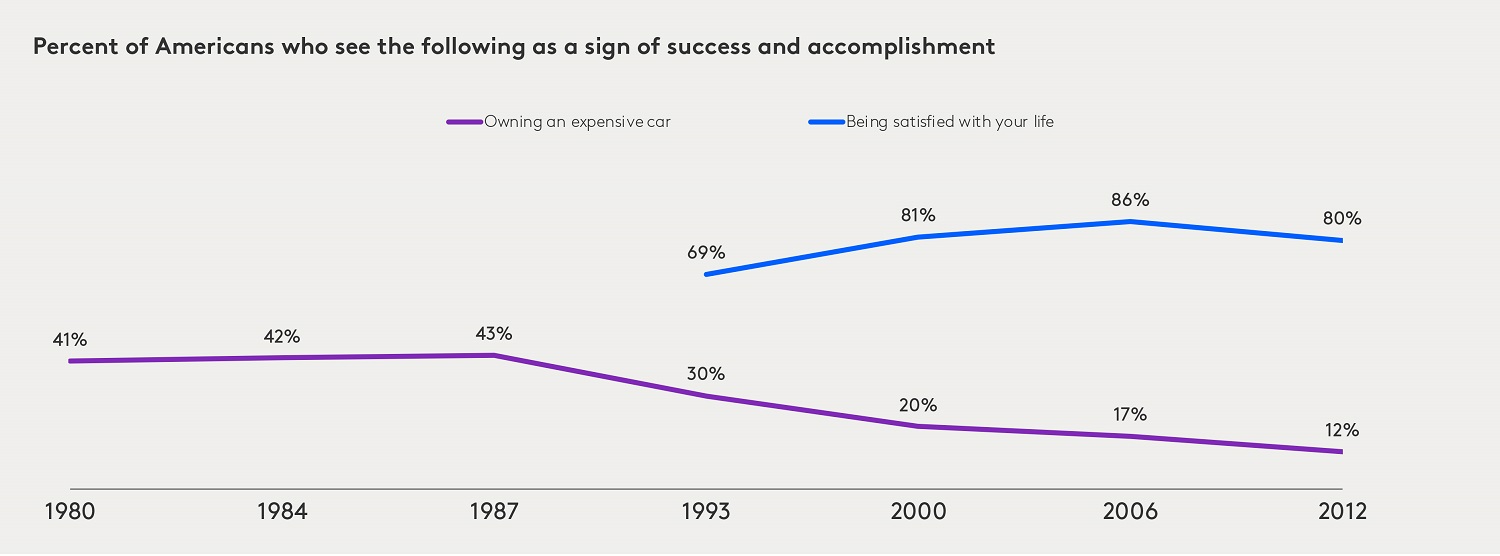The disruption from the pandemic has many Americans reconsidering their aspirations and redefining success. Is it to have a stable career? Is it to live a healthy life? Is it to connect to some bigger purpose beyond themselves? Big and small, these ideas of success and accomplishment impact how Americans live, work and ultimately how they shop.
Hindsight: The long shift from materialism to experiences
The U.S. MONITOR has been measuring success and accomplishment for decades. Over the last 50 years, the definition of success for Americans has shifted. For much of the 20th century, success was characterised by materialism and ownership—a shared presumption of no limits reinforced by full-tilt productivity growth. But plateauing productivity and a cultural shift toward our inner selves began to redefine our aspirations. Americans began to value abstract and emotional measures of success; personal satisfaction, a sense of belonging to a community, and similar intangible values that went beyond simply acquiring more stuff.

The inflection point of this shift was the Great Recession, and the cohort driving the shift was the Millennial generation. With the economy in shambles and future aspirations put on hold, Millennials redefined the good life, mostly out of necessity. They shifted value from the material to the experiential, and as the most influential generation online and on social media, Millennials led a broader culture shift that defined success no longer by how much stuff you had, but how much what you had meant to you.
Insight: Success is defined by the “Live Large, Carry Little” lifestyle
This reinvention of success changed the way Americans approach the marketplace, too. Ownership was redefined, its permanence becoming a drawback. Consumers still wanted the emotional rewards of traditional success without being tethered to its material trappings. The result was the rise of the “Live Large, Carry Little” lifestyle that defines the modern consumer.
This shift isn’t solely about smaller consumer trends like unplugging and minimalism. Those are manifestations of a broader shift. Live Large, Carry Little is about getting the same level of enjoyment, enrichment and convenience from the marketplace by emphasising the connection consumers have with things – where ownership is increasingly disconnected from consumption. This lifestyle was in part a reaction to the economic downturn of the Great Recession, but it was also accelerated by simultaneous tech innovation that allowed for ecommerce and the sharing economy to find a foothold, giving consumers options beyond traditional ownership.
Consumers’ ambitions haven’t gotten any smaller, but their material footprint has.
For marketers this means optimising your E.R.A. by focusing on its component parts: Experiences, Relationships, and Algorithms.
- How rich are the experiences you offer, online and off?
- How well are you connecting with the interests of people’s personal relationships, communities and networks?
- How much convenience and efficiency do you offer through algorithmic solutions?
Connecting with the modern consumer means optimising all of these needs and finding opportunity at their intersections.
Foresight: Living a big life in a small world
The coronavirus has impacted Americans’ aspirations in a few notable ways – increasing the importance of community, readiness, and hygiene.
Community
The pandemic has shrunken people’s worlds. Lockdowns and similar measures have made individuals’ lives more insular. As a result, many have become more dependent on their closest family members, neighbors and communities. This trend toward smaller worlds was accelerating before the pandemic as people sought stronger, personal ties in a world full of weaker, digital ties. Because the impact of the pandemic has been felt on such a local level, people will be more likely to take pride in how they, their families and their communities have responded in times of crisis.
For businesses, this means building a brand that consumers are proud to be a part of. This can be achieved across the business, from product innovation to messaging to community outreach with a focus on hyper-local efforts.
Readiness
The Live Large, Carry Little lifestyle left some people unprepared for a crisis like the pandemic. When the marketplace shuts down overnight, meagre ownership, lack of mobility and small-format living – all hallmarks of a Live Large, Carry Little lifestyle – become hurdles, not badges of success. Instead, the pandemic made self-sufficiency a critical value, elevating readiness as a new status symbol. Being ready is a new badge of status. In an uncertain world where disruptions are commonplace, being prepared is worth striving for.
For businesses, this means new pack sizes, product formulations, and supply chain options to give consumers the ability to stockpile and prepare for disruption and uncertainty.
Hygiene
Naturally, the pandemic has emphasised the importance of health and, in particular, hygiene in people’s lives. Hygiene has been elevated to aspirational status as people and businesses alike use it as a means of reassurance and safety. Hygiene is deeply connected to responsibility during the pandemic. Being seen as a responsible citizen and neighbour has increasingly become an aspirational trait.
For businesses, this means leveraging hygiene to portray yourself as a sensible and smart brand that provides social cache to the consumers who support you. Hygiene should be a primary concern at every consumer touchpoint. Use your focus on hygiene to separate you from competitors and transform your brand into an aspirational one.
To download the U.S. MONITOR report on Success and Aspirations, please complete the form below.

